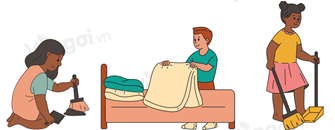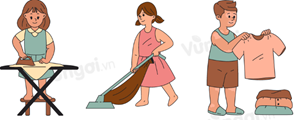Choose the best answer
The children, all three, have done ______, mopped, dusted, helped on the house and in the yard.
A. laundry
A. laundry
A. laundry
laundry (n): công việc giặt ủi
clothes (n): quần áo
groceries (n): cửa hàng tạp hóa
rubbish (n): vật bỏ đi, rác rưởi
Cụm từ: do laundry: giặt ủi.
=>The children, all three, have done laundry, mopped, dusted, helped on the house and in the yard.
Tạm dịch: Các em, cả ba, đã giặt giũ, lau chùi, quét dọn, giúp đỡ trong nhà và trong sân.
Choose the best answer
When a couple can _______chores in a way that both spouses feel satisfied with the outcome, they are showing mutual respect for one another.
A. cut (v) cắt giảm
B. run (v) chạy, vận hành
C. take (v) lấy
D. divide (v) phân chia
=> When a couple can divide chores in a way that both spouses feel satisfied with the outcome, they are showing mutual respect for one another.
Tạm dịch: Khi một cặp vợ chồng có thể phân chia công việc theo cách mà cả hai vợ chồng đều cảm thấy hài lòng với kết quả, thì họ đang thể hiện sự tôn trọng lẫn nhau.
3 - a. do the dishes (rửa bát)
1- b. mop the living room (lau sàn phòng khách)
4 - c. vacuum the carpet (hút bụi)
5- d. put away the clothes (cất quần áo)
2 - e. dust the furniture (phủi bụi nội thất)
water the plants: tưới cây
feed the cat: cho mèo ăn
do the laundry: giặt quần áo
cook dinner: nấu cơm
Dựa vào ngữ cảnh các câu văn, ta điền các cụm từ vào các chỗ trống như sau:
1. I always cook dinner. We eat at about 5 p.m.
(Tôi luôn nấu bữa tối. Chúng tôi ăn vào khoảng 5 giờ chiều.)
2. Don't forget to feed the cat. The cat food is in the kitchen.
(Đừng quên cho mèo ăn. Thức ăn cho mèo ở trong bếp.)
3. I like to water the plants in the garden. I like to watch the flowers grow.
(Tôi thích tưới cây trong vườn. Tôi thích nhìn những bông hoa lớn lên.)
4. My clothes are dirty. I have to do the laundry.
(Quần áo của tôi bị bẩn. Tôi phải giặt quần áo.)
take out the rubbish: đổ rác
wash the dog: tắm cho chó
iron clothes: là ủi quần áo
make the bed: dọn giường
Dựa vào ngữ cảnh các câu văn, ta điền các cụm từ vào các chỗ trống như sau:
1. The garbage smells bad. Let's take out the rubbish.
(Rác có mùi hôi. Hãy đổ rác đi.)
2. Our dog is dirty. It's time to wash the dog.
(Con chó của chúng tôi ở bẩn. Đã đến lúc phải rửa sạch cho con chó.)
3. After I do laundry, and my clothes are dry, I always iron clothes. Then they look better.
(Sau khi giặt và quần áo khô, tôi luôn ủi quần áo. Sau đó, chúng trông đẹp hơn.)
4. I want my bedroom to look nice, so after I get up, I make the bed.
(Tôi muốn phòng ngủ của mình trông đẹp đẽ, vì vậy sau khi ngủ dậy, tôi dọn giường.)
sweep the floor: quét nhà
vacuum the carpet: hút bụi thảm
wash the windows: lau cửa sổ
do the dishes: rửa bát
Dựa vào ngữ cảnh các câu văn, ta điền các cụm từ vào các chỗ trống như sau:
1. Where's the broom? I want to sweep the floor. It looks dirty.
(Cây chổi ở đâu vậy? Tôi muốn quét sàn. Nó trông có vẻ bẩn.)
2. Our cat doesn't like it when I vacuum the carpet. It makes a lot of noise in our apartment.
(Con mèo của chúng tôi không thích khi tôi hút bụi trên thảm. Nó gây ra rất nhiều tiếng ồn trong căn hộ của chúng tôi.)
3. After we wash the windows, we can look outside and enjoy the view.
(Sau khi chúng tôi rửa cửa sổ, chúng tôi có thể nhìn ra bên ngoài và ngắm quang cảnh.)
4. I always do the dishes after we eat dinner. I don't like dirty cups and plates in the kitchen.
(Tôi luôn làm các món ăn sau khi chúng tôi ăn tối. Tôi không thích chén và đĩa bẩn trong nhà bếp.)
washing – up (n) việc giặt giũ, rửa, cọ
cooking (n) việc nấu ăn
ironing (n) việc là ủi
Dựa vào ngữ cảnh các câu văn, ta điền các cụm từ vào các chỗ trống như sau:
1. If you do the washing – up, you have to wash the plates, cups, knives, forks, etc, which have been used in cooking and eating a meal.
(Nếu rửa bát, bạn phải rửa đĩa, chén, dao, nĩa, v.v., đã dùng để nấu nướng và dùng bữa.)
2. Cooking is the activity of preparing the food for eating, usually by gas or electricity.
(Nấu ăn là hoạt động chuẩn bị thực phẩm để ăn, thường bằng gas hoặc điện.)
3. The purpose of ironing is to remove the creases from clothes, sheets, towels, etc.
(Mục đích của việc ủi là loại bỏ các nếp nhăn trên quần áo, ga trải giường, khăn tắm, v.v.)
dust (v) phủi bụi
sweep (v) quét
mop (v) lau sàn
Dựa vào ngữ cảnh các câu văn, ta điền các cụm từ vào các chỗ trống như sau:
1. When you dust something such as furniture, you remove dust from it, usually using a cloth.
(Khi bạn phủi một thứ gì đó chẳng hạn như đồ đạc, bạn sẽ lấy bụi ra khỏi nó, thường là dùng vải.)
2. When you sweep a floor or other surface, you clean it by pushing a brush over it in order to collect the dirt in one place.
(Khi bạn quét một sàn nhà hoặc bề mặt khác, bạn làm sạch nó bằng cách đẩy một chiếc chổi lên trên nó để gom bụi bẩn vào một chỗ.)
3. When you mop something, you rub it hard in order to clean it, often using a stiff brush and water or another liquid.
(Khi lau thứ gì đó, bạn chà xát mạnh để làm sạch nó, thường dùng bàn chải cứng và nước hoặc chất lỏng khác.)
tidy (v) dọn dẹp
make the bed (v) dọn giường
hoover (v) hút bụi
1. If you hoover a surface, you clean it using a vacuum Cleaner.
(Nếu bạn bám trên một bề mặt, bạn làm sạch bằng máy hút bụi.)
2. When you tidy a room, cupboard, etc, you make it neat by putting things in their proper places.
(Khi bạn dọn dẹp phòng, tủ, v.v., bạn làm cho nó gọn gàng bằng cách đặt mọi thứ vào đúng vị trí của chúng.)
3. If you make the bed, you prepare it so that it is neat and tidy and ready for someone to sleep in.
(Nếu dọn giường, bạn chuẩn bị cho gọn gàng, ngăn nắp và sẵn sàng cho người vào ngủ.)
Fill in the blanks with the correct forms of verb phrases below.
wash up
cook meals
set the table

1. The kids
meals with chef Paul now.
2. It's 2pm. My sister will
the dishes after lunch.
3. Today is my parents’ anniversary. My father
. He's having dinner with mum.
1. The kids
meals with chef Paul now.
2. It's 2pm. My sister will
the dishes after lunch.
3. Today is my parents’ anniversary. My father
. He's having dinner with mum.
wash up (v) rửa
cook meals (v) nấu cơm
set the table (v) dọn bàn
1. The kids are cooking meals with chef Paul now.
Dấu hiệu: now (bây giờ) -> chia động từ thì hiện tại tiếp diễn (is/ am/ are + Ving)
2. It's 2pm. My sister will wash up the dishes after lunch.
Dấu hiệu: will (sẽ) -> chia động từ thì tương lai đơn (will + V nguyên thể)
3. Today is my parents’ anniversary. My father is setting the table. He's having dinner with mum.
Dấu hiệu: Today is my parents’ anniversary. -> chia động từ thì hiện tại tiếp diễn để diễn tả hành động sẽ xảy ra, có kế hoạch trước.
Tạm dịch:
1. Những đứa trẻ đang nấu bữa ăn với đầu bếp Paul.
2. Bây giờ là 2 giờ chiều. Em gái tôi sẽ rửa bát sau bữa trưa.
3. Hôm nay là ngày kỷ niệm của bố mẹ tôi. Bố sẽ dọn bàn ăn. Bố sẽ ăn tối với mẹ.
Fill in the blanks with the correct forms of verb phrases below.
take out
mop the floor
vacuum the floor

1. My father hates bad smells but he
the rubbish now.
2. I spilt sugar on the floor. My mum
because the floor is sticky.
3. My sister
for 1 hour because there are lots of crumbs on it.
1. My father hates bad smells but he
the rubbish now.
2. I spilt sugar on the floor. My mum
because the floor is sticky.
3. My sister
for 1 hour because there are lots of crumbs on it.
take out (v) vứt, bỏ
mop the floor (v) lau sàn
vacuum the floor (v) hút bụi sàn
1. My father hates bad smells but he is taking out the rubbish now.
Dấu hiệu: now (bây giờ) -> chia động từ thì hiện tại tiếp diễn (is/ am/ are + Ving)
2. I have spilt sugar on the floor. My mum is mopping the floor because the floor is sticky.
Dấu hiệu: because the floor is sticky (bởi vì sàn nhà dính) -> chia động từ thì hiện tại tiếp diễn để diễn tả đang xảy ra (is/ am/ are + Ving)
3. My sister has vacuumed the floor for 1 hour because there are lots of crumbs on it.
Dấu hiệu: for 1 hour -> chia động từ thì hiện tại hoàn thành (have/ has + Vp2)
Tạm dịch:
1. Bố tôi ghét mùi hôi nhưng ông ấy đang đi đổ rác bây giờ.
2. Tôi đã làm đổ đường trên sàn nhà. Mẹ tôi đang lau sàn nhà vì sàn nhà bị dính.
3. Em gái tôi đã hút bụi sàn nhà trong 1 giờ vì có rất nhiều mảnh vụn trên đó.
Fill in the blanks with the correct forms of verb phrases below.
sweep
iron
wash

1. I'm wearing my new clothes for the disco tonight
but right now I
them.
2. John says the floor is dusty and dirty. He will
the floor.
3. Dad really hates wrinkled clothes. He has to
the clothes but he can't do it very well.
1. I'm wearing my new clothes for the disco tonight
but right now I
them.
2. John says the floor is dusty and dirty. He will
the floor.
3. Dad really hates wrinkled clothes. He has to
the clothes but he can't do it very well.
sweep (v) quét
iron (v) là, ủi
wash (v) giặt, rửa
1. I'm wearing my new clothes for the disco tonight but now I am washing them.
Dấu hiệu: right now (bây giờ) -> chia động từ thì hiện tại tiếp diễn (is/ am/ are + Ving)
2. John says the floor is dusty and dirty. He will sweep the floor.
Dấu hiệu: will (sẽ) -> chia động từ thì tương lai đơn (will + V nguyên thể)
3. Dad really hates wrinkled clothes. He has to iron the clothes but he can't do it very well.
Cấu trúc: has/ have + to + V nguyên thể (phải làm gì)
Tạm dịch:
1. Tôi đang mặc quần áo mới cho buổi khiêu vũ tối nay nhưng bây giờ tôi đang giặt chúng.
2. John nói rằng sàn nhà rất bụi và bẩn. Anh ấy sẽ quét sàn.
3. Bố rất ghét quần áo nhăn nhúm. Bố phải ủi quần áo nhưng bố không thể làm tốt lắm.
Fill in the blanks with the correct forms of verb phrases below.
mop
clean
cook

1. Once a year I thoroughly clean everything at home and this year
Mrs. Pringle came to give me a hand with the
.
2. I've spent all morning
the floors.
3. Boys are just as keen on
meals as girls are.
1. Once a year I thoroughly clean everything at home and this year
Mrs. Pringle came to give me a hand with the
.
2. I've spent all morning
the floors.
3. Boys are just as keen on
meals as girls are.
1. Once a year I thoroughly clean everything at home and this year Mrs. Pringle came to give me a hand with the cleaning.
Dấu hiệu: mạo từ “the” -> cần một danh động từ : clean – cleaning (n) việc dọn dẹp
2. I've spent all morning mopping the floors.
Cấu trúc: spend time (on) Ving (dành thời gian làm gì)
3. Boys are just as keen on cooking meals as girls are.
Cấu trúc: be keen on Ving (quan tâm, thích làm gì)
Tạm dịch:
1. Mỗi năm một lần, tôi dọn dẹp kỹ lưỡng mọi thứ ở nhà và năm nay bà Pringle đã đến giúp tôi một tay dọn dẹp.
2. Tôi đã dành cả buổi sáng để lau sàn nhà.
3. Con trai cũng quan tâm đến việc nấu ăn không kém gì con gái.
Fill in the blanks with the correct forms of verb phrases below.
make
sweep
dust

1. He
all the furniture and then polished it.
2. He found a broom and a dustpan and he
away the broken glass.
3. You can't tidy a room before you've
the beds!
1. He
all the furniture and then polished it.
2. He found a broom and a dustpan and he
away the broken glass.
3. You can't tidy a room before you've
the beds!
make (v) làm
sweep (v) quét
dust (v) phủi bụi
1. He dusted all the furniture and then polished it.
Dấu hiệu: polished (quá khứ đơn) -> vế trước cũng chia quá khứ đơn
2. He found a broom and a dustpan and he swept away the broken glass.
Dấu hiệu: found (quá khứ đơn) -> vế sau cũng chia quá khứ đơn
3. You can't tidy a room before you've made the beds!
Dấu hiệu: have -> chia động từ thì hiện tại hoàn thành (have/ has + Vp2)
Tạm dịch:
1. Anh ấy phủi bụi tất cả đồ đạc và sau đó đánh bóng nó.
2. Anh ấy tìm thấy một cái chổi và một cái gạt bụi và anh ấy đã quét sạch mảnh kính vỡ.
3. Bạn không thể dọn phòng trước khi dọn giường!
Fill in the blanks with the correct forms of verb phrases below.
clean
iron
fold

1. My husband tries his best to wash and
the clothes.
2. It won't take me more than an hour
the house.
3. The clothes are dry now. My sister is
neatly and putting them in a basket.
1. My husband tries his best to wash and
the clothes.
2. It won't take me more than an hour
the house.
3. The clothes are dry now. My sister is
neatly and putting them in a basket.
clean (v) làm sạch
iron (v) là ủi
fold (v) gấp
1. My husband tries his best to wash and iron the clothes.
Cấu trúc: try one’s best to V (cố gắng làm gì)
2. It won't take me more than an hour to clean the house.
Cấu trúc: It takes + time + to V (tốn bao nhiêu thời gian để làm gì
3. The clothes are dry now. My sister is folding neatly and putting them in a basket.
Dấu hiệu: now (bây giờ) -> chia động từ thì hiện tại tiếp diễn (is/ am/ are + Ving)
Tạm dịch:
1. Chồng tôi cố gắng hết sức để giặt và ủi quần áo.
2. Tôi sẽ không mất hơn một giờ để dọn dẹp.
3. Bây giờ quần áo đã khô. Em gái tôi đang gấp gọn gàng và để chúng vào giỏ.

